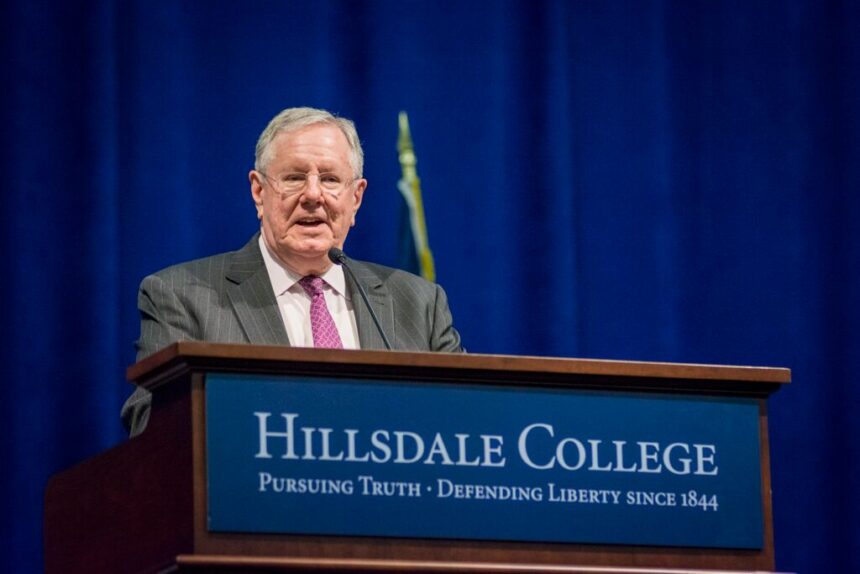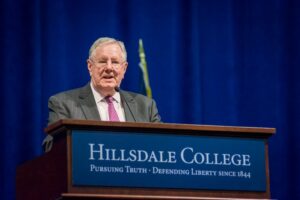Businessman Steve Forbes speaks at CCA II: “The History of Money” in the Biermann Athletic Center Monday.
Anders Kiledal | Collegian
Steve Forbes is the chairman and editor-in-chief of Forbes Business Magazine and ran as a Republican candidate in the 1996 and 2000 presidential primaries. He holds a degree from Princeton University and in 1985 was appointed head of the Board of International Broadcasting by President Ronald Reagan. He delivered a lecture titled “How the Destruction of the Dollar Threatens the Global Economy” on Monday.
What are some of the biggest impacts the Federal Reserve’s inflation of the dollar has made on the economy in the past 10 years?
It’s been very disruptive to the U.S. economy and the global economy. It’s meant that we have a period of stagnation when technology has opened up a lot of opportunities.You see the rise of political extremism and the disrupt of politics in this country — contempt for political establishment is very real. That’s a devastating consequence of what the Fed has done. John Maynard Keynes did something right when he said that when we have a debased currency, it undermines all the productive forces of the economy.
How would you describe the government’s role in the 2008 financial crisis?
Every major economic crisis has its origins in bad government policies or government mistakes. Free markets always get the rap for it. This time “greedy bankers” are the ones getting the rap. It’s the government who undermined the dollar and set the mandates for subprime mortgages and Fannie Mae and Freddie Mac; that’s where the crisis originated.
Do you think the government did the right thing given the circumstances?
They helped bring on the crisis both with the weak dollar and regulators putting in this rule for mark-to-market accounting. It put huge pressure on banks. And the government [had an] inconsistent response: They rescued creditors of Bear Stearns Cos., then mishandled Fannie Mae and Freddie Mac, then let a bank far more important than Bear Stearns — Lehman Brothers — go under, then they reversed themselves and rescued American International Group Inc., so you had full-fledged panic. When you have full-fledged panic, drastic measures are called for, and I don’t mind drastic measures, but when the panic subsided, the Fed should’ve pulled back. Instead, the government went on a binge, and Obama went on a spending binge and took over General Motors Co. and Chrysler LLC and passed Obamacare, which never would have passed without the crisis, and the Dodd-Frank bill, which severely damaged the economy. The Federal Reserve continued in the disappointing recovery with quantitative easing and a zero interest rate policy, which means big companies get credit easily and cheaply and smaller businesses and households get very little. Smaller and newer businesses are the ones that create the jobs, most of them. The Fed in the name of stimulating the economy retarded it. They’re guilty of economic malpractice.
Which Republican candidates do you think would be the best in charge of the U.S. economy?
The heartening thing is almost all of them have come up with tax simplification proposals, and some of them advocate the flat tax, which I like. Santorum and Paul and Cruz came out with some plans, and I like the fact that Sen. Cruz is in favor of linking the dollar to gold. They’re starting to move in the right direction. One so far with the least satisfactory tax plan is Marco Rubio. He has high rates, much higher than anyone else’s. His big thing is the kiddie tax credit, and I think the flat tax properly structured does far more for kids and families than the Rubio plan.
You’ve been a proponent of the flat income tax for a while now — how do you hope the flat tax will affect the economy?
The current tax code is incomprehensible. That’s a huge waste of brainpower and resources. A low rate is less of a burden on the people, reducing the price of productivity. Combine that with a semi-sensible monetary policy and this country would take off, and we have a lot of catching up to do. There’s been millions of dollars wasted on the tax code, and it’s not necessary. It’s a diversion of resources.
What does a sensible monetary policy look like?
A gold standard, stopping the hyper-regulation of banks, and letting the market set the cost of money.
How do you think the Fed has handled major economic issues over the past 10 years?
Until the ’80s and ’90s, not badly, although the ’70s was an utter disaster. The Fed needs to learn more about money, take real monetary policy 101. The two principle things it should be focused on are keeping a stable dollar and dealing decisively and quickly with the occasional financial panic or crisis. That’s it.
What can Hillsdale College students do to be positive forces in the economy? What does the economy need from us right now?
Not getting into the clutches of government and not falling for all the fads that corrupt the integrity of other institutions. Do what you have a knack for. Recognize that you’ll learn things from experience and agitate for sensible politics and economics.
If you could recommend one book on the economy today, what would it be?
“The Way the World Works” by Jude Wanniski and “Wealth and Poverty” by George Gilder.


